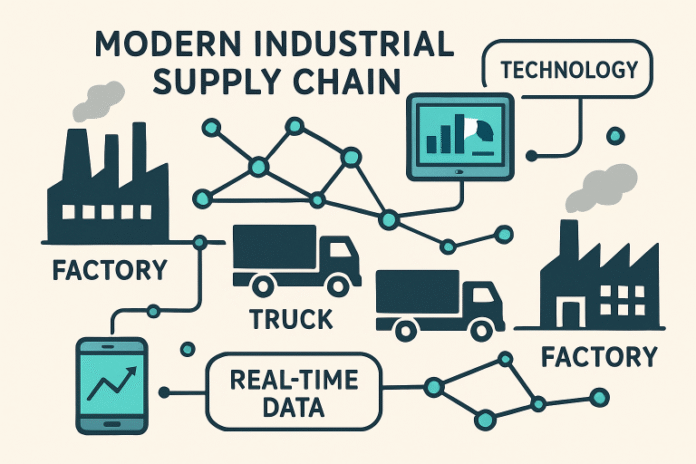Table of Contents
- Introduction
- Automation and AI Integration
- Sustainable Practices in Supply Chains
- Digital Marketplaces for Procurement
- Real-Time Tracking and IoT Implementation
- Collaborative Supplier Networks
Introduction
Industrial supply chains face growing complexity yearly, driven by technological innovation and global market shifts. Companies seeking to remain competitive are finding that adopting forward-looking strategies is essential. These new approaches transform how businesses source, manage, and deliver materials from automation to digital procurement. Organizations like Cruco Mill & Industrial Supply North Carolina are helping to drive this evolution by providing practical solutions and expert guidance to manufacturers and industrial buyers.
With rising consumer expectations and ongoing supply disruptions, businesses must prioritize efficiency, sustainability, and adaptability. Embracing advanced digital tools, real-time tracking, and collaborative platforms is no longer optional—it’s a requisite for surviving and thriving in today’s industrial marketplace. Companies are rethinking traditional supply models to incorporate next-generation technology, meet regulatory requirements, and exceed stakeholder demands for transparency and responsibility.
Innovative supply chain strategies improve day-to-day operations and create a foundation for long-term growth. Modern procurement involves integrating machine learning, environmental stewardship, and global marketplace solutions to streamline every link in the chain. As digital and physical logistics converge, enterprises that act quickly can unlock significant benefits, from lower overhead costs to greater agility and enhanced supplier relationships.
This shift brings challenges, such as integrating legacy systems or ensuring data security across new digital platforms. Still, the rewards—efficiency gains, real-time insights, and a more reliable supply base—outweigh the investment. Visionary organizations are not waiting for disruption to force their hand; they’re proactively leveraging technology and data for a competitive edge.
Automation and AI Integration
The transformative effects of automation and artificial intelligence (AI) on industrial supply chains are becoming increasingly apparent. AI takes supply chain forecasting, inventory management, and logistics coordination to new heights by analyzing large datasets and predicting market fluctuations before they happen. Through robotics and software-driven workflow optimization, automation reduces human error and accelerates production timelines. Companies that deploy these technologies successfully are seeing increased supply chain resilience and adaptability, enabling them to react swiftly to market changes and disruptions. According to McKinsey & Company, AI-driven initiatives can reduce forecasting errors by up to 50% and inventory reductions of up to 20%.
Sustainable Practices in Supply Chains
Sustainability has emerged as a fundamental consideration in industrial supply chain management. Companies are instituting responsible sourcing policies, transitioning to renewable energy for their operations, and leveraging technology to monitor and minimize their environmental footprint. Instead of viewing sustainability as a compliance issue, innovative organizations recognize it as a driver of process efficiency and brand value. For example, life-cycle assessments and supplier audits are becoming standard, ensuring materials are ethically sourced and manufactured with minimal waste. Businesses that prioritize sustainability appeal to eco-conscious customers and position themselves for future regulatory demands and supply resilience.
Digital Marketplaces for Procurement
The procurement process is undergoing rapid modernization via digital marketplaces, which centralize purchasing from various suppliers. This transparency lets buyers easily compare prices, shipment times, and vendor reliability. Automated procurement platforms can further streamline approvals, track expenditures, and provide detailed reporting for better budgeting and compliance. The expansion of these digital tools means businesses are no longer restricted to local or established supply relationships—they can seek out best-in-class products from around the globe while ensuring procurement remains efficient and traceable. A recent article by Forbes highlights how these platforms are leading to cost savings and process improvements for companies, large and small.
Also read: Innovative Label Concepts for Unique Packaging
Real-Time Tracking and IoT Implementation
Internet of Things (IoT) devices and advanced tracking technology have brought a new level of visibility and control to industrial supply chains. Real-time asset monitoring allows businesses to proactively respond to delays, manage inventory in motion, and anticipate maintenance for crucial equipment. Sensor-equipped cargo can continuously update temperature, humidity, and handling conditions—essential for safeguarding sensitive goods. IoT integration mitigates risk and generates actionable data for continuous improvement. Enhanced tracking leads to a more transparent, reliable, and responsive supply chain, essential for industries with high compliance or safety standards.
Collaborative Supplier Networks
The move towards collaborative networks is revolutionizing supplier relationships. Rather than transactional exchanges, companies are investing in shared data platforms and joint planning initiatives with their suppliers, distributors, and partners. This integrated approach improves demand forecasting, reduces redundancies, and aligns incentives across the supply ecosystem. Establishing mutual trust and regularly sharing performance insights leads to greater supply continuity and readiness for market demands. According to analysis by Supply Chain Digital, businesses that engage in deep supplier collaboration consistently outperform their industry peers regarding innovation and supply assurance.
By boldly adopting these innovative approaches, organizations can strengthen every link in their supply chain. Embracing technology, sustainability, and collaboration enables businesses to build robust, future-ready supply networks that deliver long-lasting value in today’s industrial sector.
